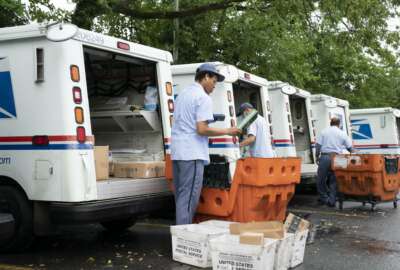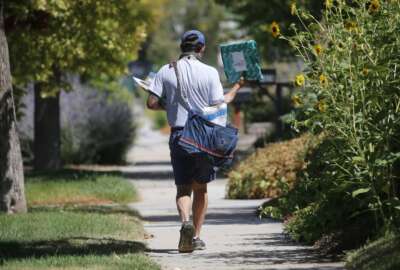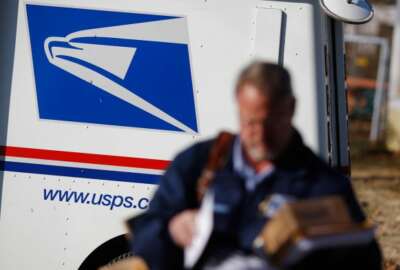Labor Dept launches USPS investigation following payroll error impacting more than 50K rural carriers
USPS says many of the more than 50,000 impacted rural carriers have been made whole, and that, “with limited exceptions,” it paid carriers what they were owed...
The Postal Service is telling members of Congress that most of the rural letter carriers who missed a paycheck or received a partial paycheck last month are no longer waiting on back pay.
USPS says many of the more than 50,000 impacted rural carriers have been made whole, and that, “with limited exceptions,” it paid carriers what they were owed within one or two pay periods.
But affected carriers tell Federal News Network that USPS still hasn’t paid them the correct amounts, and that not receiving their paycheck on time led to overdraft fees from their banks. The situation marked a breaking point for one rural carrier, who is leaving the agency.
Several rural carriers waiting on their back pay contacted their state Labor Departments. Now the federal Labor Department is looking into the issue.
A Labor Department spokesperson told Federal News Network this week that its Wage and Hour Division “can confirm that it has an open investigation into USPS.”
“No additional information can be provided as it is ongoing,” the spokesperson said.
USPS Government Liaison Director Michael Gordon told lawmakers in a Sept. 29 letter that a programming error in the payroll process led to a “significant number of timecards being rejected from payroll processing” ahead of the Sept. 1 pay period.
“The programming issue has been identified and remediated, and the Postal Service worked expeditiously on the payroll adjustments to reflect updates to paychecks,” Gordon wrote in his letter to lawmakers.
Gordon said the payroll issue was isolated to just the Sept. 1 paycheck.
USPS, according to Gordon, learned about the programming error late in the evening on Aug. 28 while processing payroll for the upcoming pay period. On Aug. 29, the agency notified the National Rural Letter Carriers Association and timekeepers for rural carriers.
USPS gave employees waiting on their Sept. 1 paycheck the option of receiving a “salary advance,” issued as a money order.
Rural carriers who accepted the money orders would receive 65% of their gross pay — a rough estimate of their typical take-home pay. Carriers would then pay back the salary advance once they received their actual paycheck.
A USPS spokesperson told Federal News Network last month that 68% of impacted employees, as of Sept. 12, requested and received a salary advance in the form of a no-fee money order.
Gordon told lawmakers that, “with limited exceptions,” rural carriers impacted by the payroll error have received their back pay, and that USPS made adjustments to correct the programming error.
Gordon said those adjustments happened last month, and that carriers received their back pay on the next pay period, Sept. 15, or the following period, Sept. 29.
The programming error impacted both career and non-career carriers, but it did not impact all rural carrier employees. Gordon said 52,312 rural carriers across the country were impacted.
“Following an in-depth assessment of our payroll IT systems, our IT team developed improvements to our payroll IT programming and testing processes for immediate implementation, and our application developers will receive additional training to prevent similar programming errors in the future,” Gordon wrote.
Gordon said application developers are expected to complete the additional training by Oct. 31.
‘Rural letter carriers can’t afford a missed paycheck’
USPS provided this update to Sens. Tina Smith (D-Minn.) and Amy Klobuchar (D-Minn.), as well as Rep. Angie Craig (D-Minn.), after the lawmakers sought more information about the payroll error in a Sept. 25 letter.
In that letter, lawmakers, citing Federal News Network’s earlier reporting, told USPS that rural carriers missing their paycheck for weeks was “unacceptable,” and demanded “immediate back pay for the impacted workers.”
“Like a lot of American families, many rural letter carriers can’t afford a missed paycheck,” the lawmakers wrote.
Lawmakers said the money orders carriers received were an “insufficient proposal that fails to address the scope of these employees’ needs, and does not demonstrate a commitment to getting these workers the pay they earned.”
“The Postal Service cannot function without its employees, and there must be accountability for this disregard for rural letter carriers,” the lawmakers wrote on Sept. 25.
Smith told Federal News Network in a statement earlier this month, after receiving a response from USPS, that she’s “committed to ensuring that September’s payroll system error is fully resolved and does not happen again.”
“Letter carriers are essential workers whose services are critical to small towns and rural places in Minnesota and around the country — and they deserve to be treated by the USPS as such,” Smith said.
Klobuchar told Federal News Network in a statement that she and her colleagues are “working to make sure that September’s payroll system error is resolved once and for all, and all letter carriers receive their back pay as quickly as possible.”
“From receiving paychecks to accessing prescriptions and staying connected to family and friends, Minnesotans rely on letter carriers every day,” Klobuchar said.
‘Morale is at an all-time low’
Several rural carriers confirmed to Federal News Network that they received their back pay last month, but are still dealing with the fallout of a late paycheck.
Carriers said they’re still trying to rectify discrepancies between the amount of back pay they received and the amount they received as a “salary advance.”
A rural carrier impacted by the USPS payroll error told Federal News Network that they received their back pay on Sept. 29, “which of course was not ideal, having to wait an additional 29 days on your money that you had already worked for.”
“Having to wait the extra four weeks on our money was very frustrating, to say the least — especially in this day and age of computers,” the rural carrier said. “Most large corporations would have seen to it that their employees were paid right away, and would not have made them wait four weeks for their money,” the carrier said.
The carrier started working for USPS earlier this year, but said some of their more senior coworkers said the payroll error was “nothing new and happens quite often.”
“There are lots of other carriers that are very frustrated, especially this year, since they have lost a ton of money with their evaluations going down,” the carrier said.
USPS in May implemented a new pay system for rural carriers that had been in the works for more than a decade. About two-thirds of rural carriers saw pay cuts once the new Rural Route Evaluated Compensation System (RRECS) went into effect.
“Overall, from what I have seen and heard morale is at an all-time low due to payroll issues and pay cuts,” the carrier said.
‘Only a matter of time before something happens again’
NRLCA National President Don Maston said in an interview this week that the USPS payroll issue has been resolved for most of the union’s members, but added that the error created “spin-off issues” rural carriers are still trying to resolve.
“We know that it caused problems for some people. It’s not like there was no pain that went along with it. But people did get their money back,” Maston said.
Full-time regular rural carriers had an easier time receiving their back pay for the Sept. 1 pay period, because they typically deliver on the same route each day.
Part-time employees, however, often fill in on different routes throughout the week, which takes USPS payroll more time and effort to calculate before it can issue the carrier a paycheck.
“There’s always that question mark, when dealing with the Post Office. This particular time, they did get it fairly accurate, as far as getting people paid. I know there were a couple of individuals that had some side issues, and then there is the long process of making sure everything is right,” Maston said. “It’s complicated, and it takes a lot of really looking at the numbers hard to make sure it’s correct. I am sorry that our carriers had to suffer that, and hopefully, the employer will do what it takes to make sure this doesn’t happen again.”
Maston said the recent USPS payroll error caused more of a headache than any other IT glitch of its kind in recent history, and that the incident should serve as a warning sign for USPS to update its legacy system.
“It’s just really an indication they need to take a little bit of money and look at redoing their payroll system,” Maston said. “The Postal Service has an antiquated system that needs to be updated. It’s been around for decades … It’s only a matter of time before something happens again.”
While Maston said this is the first time in his career he’s seen a payroll error of this magnitude, he said that “every pay period, there are issues that affect some carrier somewhere.”
“Every pay period, there are issues within the system, because there is a human element as well. It’s not just the old system, but there is a human element of inputting payroll codes and data into a system. If that local postmaster or supervisor makes an error in the code they put in, then the carrier is forced to go through this payroll adjustment process,” Maston said.
“That really is unacceptable,” he added. “It’s different carriers all the time. It’s not the same carrier, generally, every week that has the same problem. But if it’s you and your paycheck, and you have bills to pay, and you don’t get your pay as you expected, it is a major issue.”
A second rural carrier told Federal News Network that they contacted the Missouri Department of Labor after waiting on their back pay for weeks.
“They said I was one of many,” the carrier said.
The carrier received their paycheck on Sept. 29, but said it “still doesn’t cover all the bank fees that I had to pay because of this.”
The carrier said their household has automatic payments deducted from their bank account every month to cover their house payment, insurance and other reoccurring expenses. They said they incurred $300 in overdraft and related fees from their bank.
“The bank wouldn’t do a stop payment, since the items have come out of our account previously,” the carrier said. “When you’re expecting a $2,000 check, and don’t get it, it puts you in a real bad situation financially.”
The carrier said waiting on back pay for so long was the final straw, and that they decided to leave the agency. The carrier said Friday was their final day on the job.
“I feel for the families going through this, as it has been a nightmare,” the carrier said.
A third carrier said she received their back pay on Sept. 29, but said she is still trying to chase USPS for about $125 she says she’s owed.
The carrier said she didn’t receive her Sept. 1 paycheck on time, but her postmaster said she would receive the back pay the following pay period.
But two weeks later, the carrier said she didn’t receive her back pay — just the check she was owed on Sept. 15
“I told my postmaster that I would not be returning to work without some sort of an answer to where my money was,” she said. “No one could live like this. He had no response to me. I received another portion of the check that was missing a month after.”
However, the carrier said that USPS still owes her about $125, based on the hours she worked between Sept. 12 and Sept. 25.
“I have requested a pay stub for the money I was paid for those two weeks. Nothing to date,” the carrier said. “If you have ever seen a USPS pay stub, they attempt to make it hard to see what you are actually paid for.”
“[It’s] still not correct and still can’t prove them wrong, because I have no pay stub for 8/12-8/25. So no, this is not resolved— at least for me,” she added.
Copyright © 2025 Federal News Network. All rights reserved. This website is not intended for users located within the European Economic Area.
Jory Heckman is a reporter at Federal News Network covering U.S. Postal Service, IRS, big data and technology issues.
Follow @jheckmanWFED






